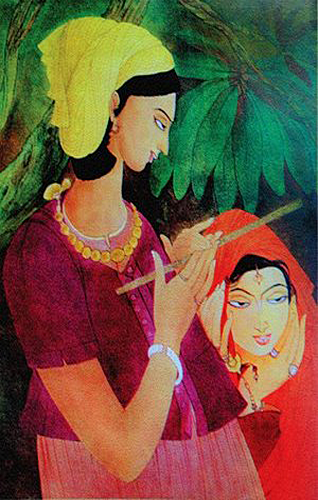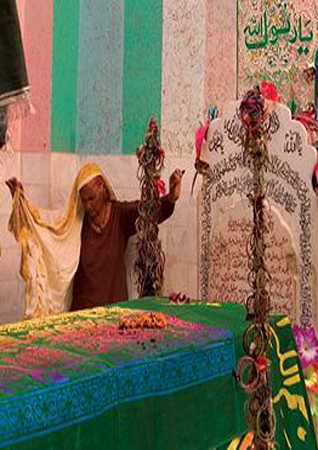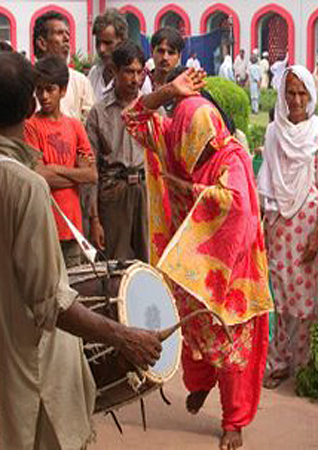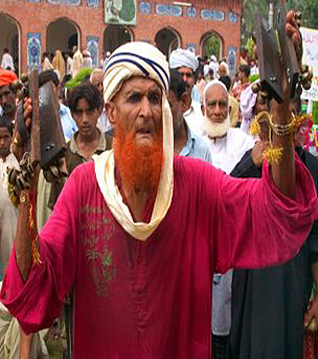
Abdur
Rahman
Chughtai's
Heer
Ranjha
Images: Homepage and thumbnail - Scene from the Tramway production. Below, 1st from bottom - a street singer in Punjab belts out the epic. 2nd from bottom: a street dancer as Heer. 3rd from below: a lone dancer at the tomb of Heer Ranjha.



Film/Stage
'Heer Ranjha' Retold
At the Tramway
by RACHEL DEVINE
There's nothing quite like a tale of two young lovers thwarted to exercise the tear ducts.
Shakespeare might have written the best known love story in Romeo and Juliet, but Heer Ranjha, an ancient Punjabi folktale, bears striking parallels to the fate of those testy Capulets and Montagues.
One of a famous quartet of popular tragic romances of the Punjab - a region whose scribes could have taught Giuseppe Verdi a thing or two about melodrama - it has been updated and relocated to Glasgow, Scotland by the Carluke playwright Shan Khan.
In his version, the streets of Pollokshields stand in for the fields of Punjab.
Heer Ranjha - as depicted in this modernized version - is the story of Ranjha, a poor Muslim restaurant worker who is ostracised by his family and cut off by his faith. In a fit of depression, he throws himself off the George VI bridge, presumably choosing that one ahead of the Kingston so that the play can continue.
He is pulled out of the Clyde by a boatful of partygoers, led by the beautiful Heer, the fast-living daughter of a Glasgow curry magnate and a Sikh. Love, intrigue and tragedy ensue in equal measure. It's thrilling, sensual and seductive and the two actors who play the title roles look like they've stepped off the set of a Bollywood movie.
Baz Lurhmann, eat your heart out.
"I had been trying for some time to find a story that would attract Asian audiences [Glasgow's Asian community is primarily Sikh and also Punjabi from both sides of the border that now divides Greater Punjab] and Heer Ranjha was something I had come across very frequently in my discussions with [local] people," says Lalitha Rajan, artistic director of Ankur Productions.
"I wanted to make it relevant and contemporary and I wanted a writer who had an ear for Glaswegian dialect, because it has its own unique linguistic richness.
"I knew Shan had the courage to address some of the sectarian issues we wanted - and issues such as forced marriages - that other writers wouldn't have felt as comfortable with, because they were entering a cultural landscape that wasn't theirs."
Notoriously particular about his choice of subject matter, Khan was reluctant to get involved at first, but was soon seduced by the story and the possibility of creating a modern romantic classic for his homeland.
"When we first approached Shan, he said he didn't do Asian plays because he didn't want to be pigeonholed as an Asian playwright," says Rajan. "But for me it was more about pulling off a contemporary version of Romeo and Juliet for an Asian-Scottish audience. Most of Shan's plays are populated primarily with male characters and testosterone-driven scenarios, and I sold it to him as a Baz Lurhmann-style Romeo and Juliet. It's not a propagandist play - it just touches on the social issues that I feel are part of our remit as a company."
Rajan founded Ankur in 2004 in an effort to address the lack of participation by black and minority communities in the arts in Scotland. Tempting Khan back to Scotland was a huge coup for the company.
"Being able to attract somebody like Shan is a huge step for us from where we started out as an organization doing fairly small community-based projects to then get to the stage where we can put on a big show. It has been fairly ambitious in scope from early on, in terms of bringing Shan on board," says Rajan.
"Nothing like this has been done in Scotland - certainly nothing that addresses the South Asian communities in this way."
It's easy to forget that 38-year-old Khan, who started out as an actor, switched to writing only in 2000, when his debut, The Office, was awarded the Verity Bargate Award and staged at the Edinburgh International Festival.
Since then, he has wowed the critics with Prayer Room, in which a group of Jews, Muslims and evangelical Christians at an unnamed university disapprove of each other's occupation of the multi-faith prayer room. In 2006, he penned the libretto for the ENO's Gaddafi: A Living Myth.
He has an eye for controversy, but messing around with a revered Punjabi folktale was another matter altogether.
"I was slightly concerned that it would be too controversial to rework the story because it's one that people know very well and have their own idea of how it should be told," says Rajan. "We've switched some elements of the story in terms of who is Muslim and who is Sikh, and who dies and who doesn't, so I did have anxieties.
"But at heart, it's a story about innocent love - young love - and there is something incredibly universal about that. So many people can identify with that, far beyond the Asian community."
Rajan is delighted to have hit the chemistry jackpot in the casting of Nalini Chetty and Taqi Nazeer as the star-crossed lovers. Their steamy promotion shots make Claire Danes and Leonardo DiCaprio look chaste in comparison.
"Bring a box of tissues," says Rajan, before heading back to rehearsals. "You're going to need them."
Heer Ranjha (retold) is at the Tramway, Glasgow, Scotland until November 29, 2008.
[Courtesy: The Sunday Times]
November 24, 2008
Conversation about this article
1: Gurteg Singh (New York, U.S.A.), November 24, 2008, 9:37 AM.
I wonder why in these movies like Jab We Met and this so called modern version of "Heer Ranjha" it has to be a Sikh women who is lured or has to run away with a Hindu or a Muslim ? With the background of targeting of Sikh women in UK and their forced conversions, this movie by "Khan" may be another subtle attempt to advance the hidden agenda.
2: Ravinder Singh (Sydney, Australia), November 24, 2008, 11:13 PM.
I agree with Gurteg Singh. Why can't the story be about a Sikh guy with whom a Muslim girl falls in love? This can only stop when Sikhs start telling their own stories.
3: Suzy Kaur (Oxford, England), November 25, 2008, 5:51 AM.
There is no such conspiracy, Gurtej Singh ji, any more than there is a conspiracy when Sikh men are depicted in fiction, drama or movies in relationships with Hindu, Muslim or White women. But it's strange how the burden of representation is placed on women in this equation, isn't it? I went to see the play and wasn't really impressed with it. But that's really a separate issue.
4: Suzy Kaur (Oxford, England), November 25, 2008, 7:49 AM.
Ravinder Singh ji, off the top of my head I can think of three large scale movies about Sikh men in relationships with Muslim women. Shaeed-e-Mohabbat with Gurdas Mann, the silly Bollywood movie Gadar, the recent Canadian movie 'Partition'. I can also name a few novels like Vikram Chandra's 'Sacred Games' about a Sikh policman married to a Hindu lady. I can also think of a novel called Tourism by Nirpal Dhaliwal about a Sikh boy in a variety of cross cultural relationships, including discussing the desire Sikh men have for Pakistani women. I also recently read a novel by a Scottish writer called Anne Donovan all about a white woman who has a relationship with a Sikh man. If that does not satisfy the need of some individuals to have their self-esteem raised, then I suggest we introspect and ask why it offends male pride so much to have a simple work of fiction describe what happens all time in the real world - that people form relationships across religious boundaries all the time, despite the efforts of men to treat women as little more than buffalo and other farm animals as the repositories of male honour and virility.
5: Harshpal Singh (India), February 14, 2009, 9:23 AM.
Interesting, Muslim boy and Sikh girl story, set in Glasgow ... sounds interesting. This is probably the best version of Heer Ranjha I have found on the net. I can't see this play as I live in india, but I would love to see this combination. My only concerns are ... I hope it is not in Bollywood style. Somehow, I have started hating those running-around-the-tree scenes and the totally unnecessary song-and-dance sequences.
6: Kathy (U.S.A.), May 16, 2010, 12:09 PM.
Is there anywhere that I can buy this updated movie?


